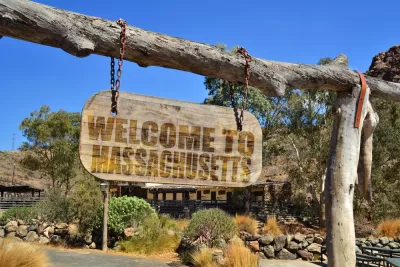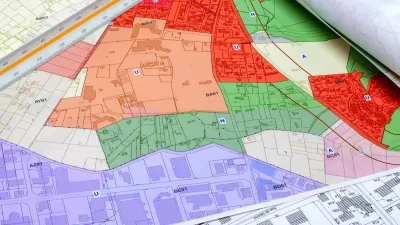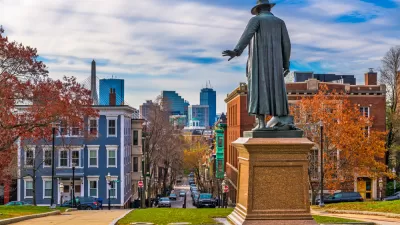An update to the state's zoning laws—the first update of its kind since 1975—is moving forward through the Massachusetts Legislature.

"The Massachusetts State Senate today voted 23-15 to pass the zoning reform bill, S.2311, after approximately three hours or so of debate and ammendments [sic]. Twenty of 63 ammendments [sic] were adopted, with the rest either defeated or withdrawn," reports Mathew M. Robare.
According to Robare, the bill has teeth: "the as-of-right multifamily provision establishes a minimum density of eight units per acre for rural communitiers [sic] and 15 for others and if municipalities don’t comply, courts can provide relief."
For more background on the bill, Shira Schoenberg previewed the Senate vote earlier this week for MassLive.com. That article presents the opposing sides in a debate about whether the zoning reform bill would support or stymie new development. According to Schoenberg, the state's "zoning laws have not been comprehensively updated since 1975," and "[planners] say they are outdated and discourage development." Planners have given the zoning reform bill passed by the State Senate mixed reviews, however, according to Schoenberg.
According to Robare, the bill will still require approval by the Massachusetts House of Representatives and a signature by Governor Charles Baker.
FULL STORY: Zoning reform passed by Senate

Manufactured Crisis: Losing the Nation’s Largest Source of Unsubsidized Affordable Housing
Manufactured housing communities have long been an affordable housing option for millions of people living in the U.S., but that affordability is disappearing rapidly. How did we get here?

Americans May Be Stuck — But Why?
Americans are moving a lot less than they once did, and that is a problem. While Yoni Applebaum, in his highly-publicized article Stuck, gets the reasons badly wrong, it's still important to ask: why are we moving so much less than before?

Research Shows More Roads = More Driving
A national study shows, once again, that increasing road supply induces additional vehicle travel, particularly over the long run.

Judge Halts Enforcement of Anti-Homeless Laws in Grants Pass
The Oregon city will be barred from enforcing two ordinances that prosecute unhoused residents until it increases capacity and accessibility at designated camping sites.

Advancing Sustainability in Los Angeles County Schools
The Los Angeles County Office of Education’s Green Schools Symposium brings together educators, students, and experts to advance sustainability in schools through innovative design, climate resilience strategies, and collaborative learning.

Using Old Oil and Gas Wells for Green Energy Storage
Penn State researchers have found that repurposing abandoned oil and gas wells for geothermal-assisted compressed-air energy storage can boost efficiency, reduce environmental risks, and support clean energy and job transitions.
Urban Design for Planners 1: Software Tools
This six-course series explores essential urban design concepts using open source software and equips planners with the tools they need to participate fully in the urban design process.
Planning for Universal Design
Learn the tools for implementing Universal Design in planning regulations.
City of Moreno Valley
Institute for Housing and Urban Development Studies (IHS)
City of Grandview
Harvard GSD Executive Education
NYU Wagner Graduate School of Public Service
City of Cambridge, Maryland
Newport County Development Council: Connect Greater Newport





























